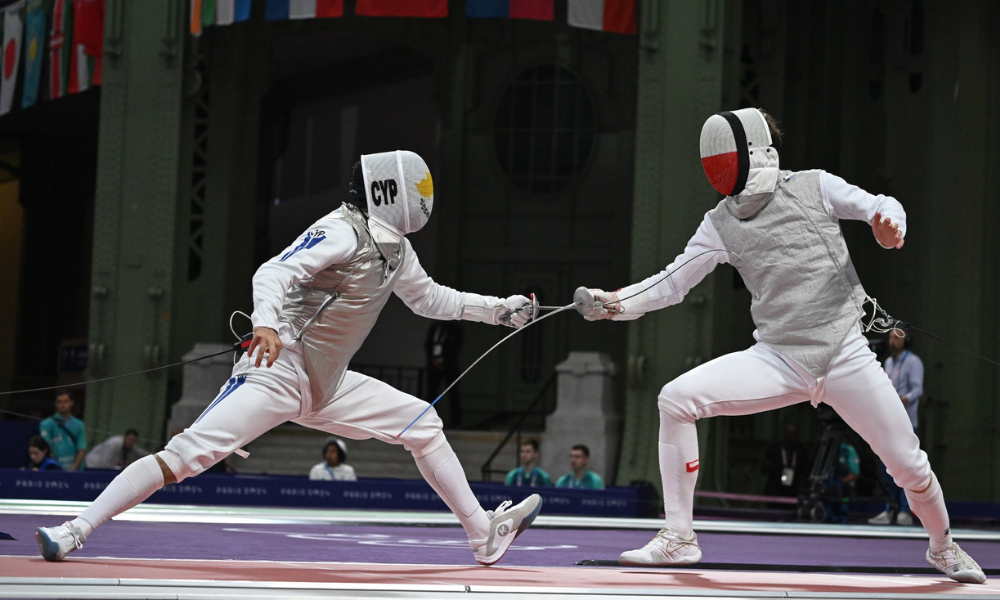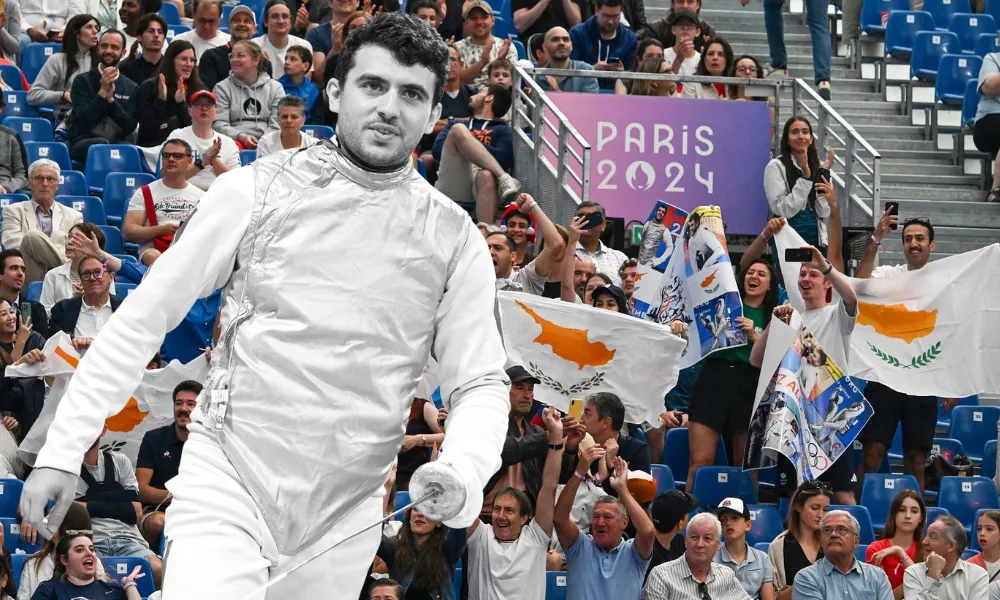At seven years old, Alex Tofalides was handed a foil for the first time in a school club in London. It was meant to be just another after-school activity, but something about the sport stood out immediately. The speed, the precision, and the puzzle-like nature of fencing gave him an outlet that was both physical and intellectual.
The piste quickly became a place of expression. Each session was a test of discipline and creativity, a daily challenge to solve problems in motion. Improvement became addictive, and what began as curiosity soon grew into a defining pursuit. In an interview with Politis, Alex shared his arduous, hard-fought for, and rewarding journey.
Scholar and athlete
Balancing academics with elite sport became the next great challenge. His years at UCL and LSE meant late nights with essays and early mornings with training, and often the two overlapped. Managing both required discipline, sharp time management, and resilience under pressure.
The rewards went beyond degrees. Research skills sharpened his ability to study opponents. History and politics offered perspective that helped him stay grounded when results went against him. University life and fencing fed one another, building a foundation of critical thinking and composure.
A choice of legacy
The Rio 2016 cycle brought profound loss. Within a short span, his father, grandfather, and grandmother passed away. Out of grief came a decision: to fence for Cyprus, his family’s homeland. On the surface, it was a career choice, but on a deeper note, it was one rooted in legacy and identity.
Without the backing of a large federation, he had to adapt. At times he became his own coach and strategist, taking on responsibilities far beyond the piste. Independence was demanding, but it also gave him freedom. Representing Cyprus carried weight and pride, and it reshaped his identity as an athlete.
Making history in Paris
In 2024, that path culminated in history. At a qualifier in Luxembourg, Alex secured a ticket to the Paris Olympic Games, becoming Cyprus’s first-ever Olympic fencer. For him, the moment carried the weight of two decades of sacrifice, near-misses, and setbacks.
The emotions were overwhelming. Pride, relief, and vindication. For Cyprus, it was a breakthrough. A nation without infrastructure or tradition in fencing now had a place on the Olympic stage. He hopes that moment planted a seed for the next generation of Cypriot fencers.

The underdog spirit
Fencing for Cyprus meant stepping into every bout as an underdog. His opponents often came from nations with deep traditions and vast resources. What he lacked in infrastructure, he made up for with creativity, resilience, and the advantage of being underestimated.
His source of strength was defined by the underdog spirit. It turned pressure into freedom, allowing him to fight against giants of the sport. Beyond the piste, the same mindset shaped his outlook on life, instilling courage and resourcefulness in every new challenge.
Lessons from setbacks
His path was marked by near misses. He fell short of qualifying for Rio 2016 and Tokyo 2020 by the narrowest of margins. Each disappointment could have ended the journey, yet each one forced him to rebuild.
The loss of his father deepened the challenges, but also strengthened the meaning of his pursuit. The defining moment came in 2024, when persistence finally outlasted failure. Luxembourg became the place where years of heartbreak transformed into triumph.
Building the next generation
Alex’s journey now extends beyond his own ambitions. At Inspion Sports, where he serves as director and coach, he focuses on giving young athletes the mentorship and structure he often lacked. His lessons are clear: discipline outweighs talent, mindset shapes results, and setbacks can be reframed into progress.
Coaching has also sharpened his own perspective. Explaining tactics forces reflection, and many of the exercises he uses with students come directly from his own training routines. His aim is to show that mental skills can be trained just as deliberately as physical ones.
Fighting for the mind
His advocacy for mental health in sport is not abstract. It comes directly from his own career and the lessons that shaped it. In Fighting for Your Dream, the book he recently authored, Alex distills those lessons into practical tools. The focus is clear: success in sport and in life is as much mental as it is physical.
The book introduces methods he used himself to qualify for the Olympics. Compartmentalisation, affirmations, and scenario planning are explained not as vague concepts but as systems to train the mind with the same rigor as the body.
Reframing setbacks, developing routines, and strengthening self-belief form the foundation of his approach. What makes the book distinctive is its openness: he does not present an untouchable version of the athlete’s life, but reveals the doubts, the near-misses, and the moments where resilience mattered most.
He sees Fighting for Your Dream as more than a handbook for athletes. Its principles can guide anyone facing pressure, whether preparing for an exam, leading a team, or navigating personal struggles. Mental training, he argues, is a skillset that transforms how people respond to adversity. Writing the book has also been part of his own process of reflection, a way to turn years of hard-won experience into something lasting and useful for others.
A global citizen
His multicultural roots, spanning both the UK and Cyprus, gave him adaptability and ease in crossing borders. Speaking multiple languages and moving between cultures prepared him for fencing’s international stage.
Carrying Cyprus onto that stage holds particular meaning. Each time he competes, he not only represents himself but also tells the story of a nation rarely seen in fencing, sharing it with the wider world.
Looking ahead
The Paris Games are not an ending but a marker along the way. His ambition is to qualify again and to keep competing at the highest level. Just as importantly, he wants to build a future for fencing in Cyprus, so that his milestone does not stand alone.
Beyond the piste, Alex aims to expand his work as a coach, writer, and speaker. His hope is that his story proves to young Cypriots that nothing is impossible, and that his achievement becomes the first chapter of a much longer story for the sport on the island.
